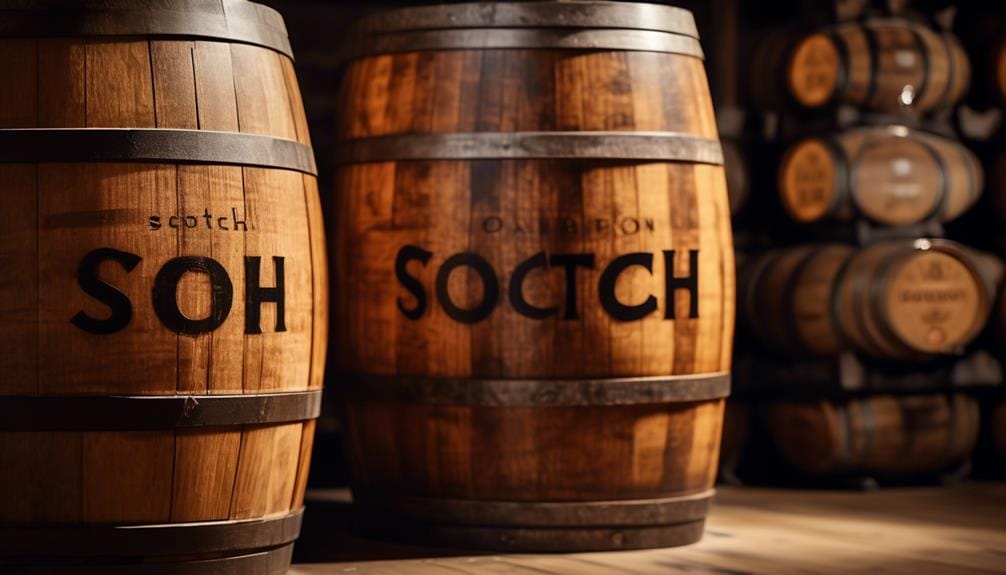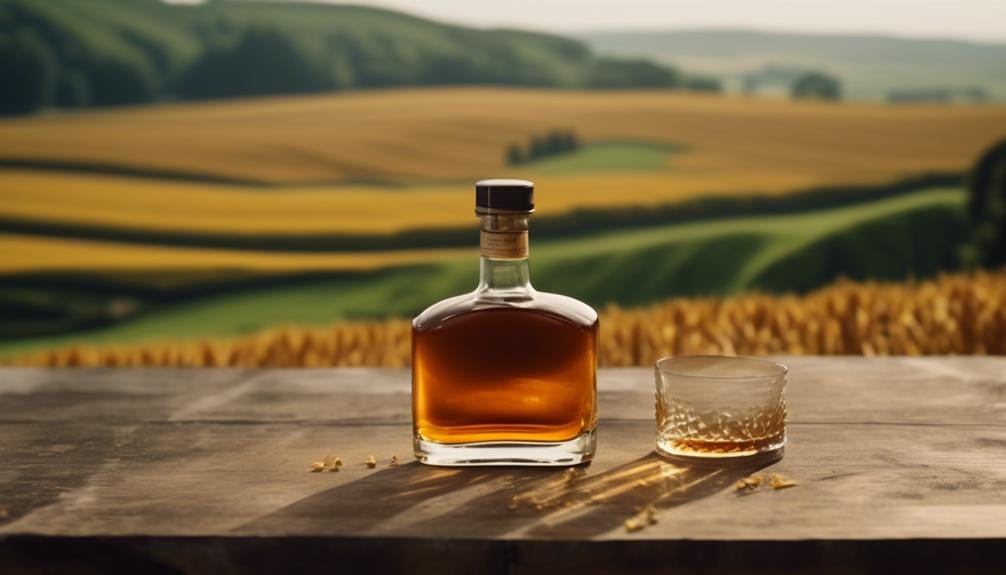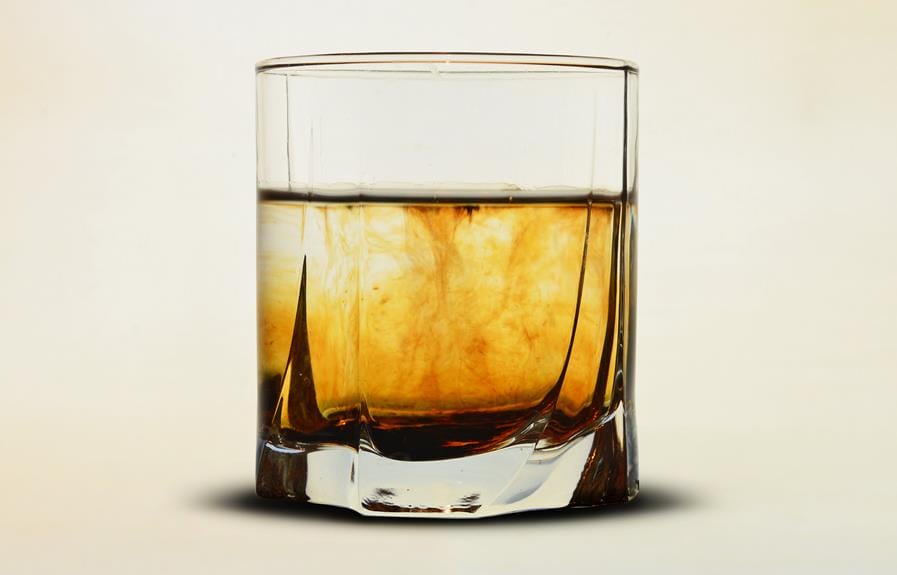Imagine you’re at a dinner party, surrounded by friends and colleagues. As the conversation turns to whiskey, your interest is piqued. You listen intently as one person passionately describes the nuanced differences between Scotch and Bourbon, their voices rising and falling like a well-composed symphony.
But just as they’re about to reveal the ultimate distinction, the conversation abruptly shifts, leaving you hanging in suspense. Curiosity gnaws at you, compelling you to uncover the secret behind these two beloved spirits.
Well, fear not, for in the next few paragraphs, we shall unravel the mystery and shed light on the remarkable dissimilarities between Scotch and Bourbon.
Key Takeaways
- Scotch whisky is made from malted barley and aged in Scotland, while bourbon is primarily made from corn and associated with Kentucky.
- The production methods and ingredients used in Scotch and bourbon result in distinct flavour profiles, with Scotch offering a wide range of flavours and bourbon generally being sweeter.
- The aging process in oak barrels plays a crucial role in developing the flavours, colour, and aroma of both Scotch and bourbon.
- Regional differences contribute to the specific characteristics of each whiskey, with Scotch being exclusively made in Scotland and bourbon being associated with Kentucky.
Production Methods
To understand the difference between Scotch and Bourbon, it’s important to delve into their distinct production methods. Scotch whisky is typically made from malted barley and must be produced and aged in Scotland. The production process includes malting, fermentation, distillation, and cask maturation at a single distillery. This gives Scotch its unique flavours and characteristics.
On the other hand, Bourbon is made primarily from corn, with at least 51% corn content. It must be aged in new, charred American white oak barrels. The production process involves distilling fermented grains and aging in these specific barrels. This gives Bourbon its own distinct flavour profile.
The difference in the production methods also reflects the regional differences between the two spirits. Scotch is closely tied to Scotland, where it has been produced for centuries. The use of barley and the traditional production process contribute to the rich history and reputation of Scotch whisky.
Bourbon, on the other hand, has its roots in the United States. The use of corn and the aging process in charred oak barrels are key elements of Bourbon production. These factors contribute to the unique taste and character of American Bourbon.
Ingredients Used
When it comes to the ingredients used, both Scotch and Bourbon differ in their grain composition and production methods. Here are the key differences to note:
- Bourbon must be made from 51% or more corn grain in its mash bill. This high corn content gives Bourbon its characteristic sweetness and smoothness. Other grains like barley, rye, and wheat can also be used, but corn is the dominant ingredient.
- Scotch, on the other hand, is usually produced by malting a single grain type, typically barley. Single malt Scotch whisky is made entirely from malted barley and comes from a single distillery. This gives Scotch its distinct flavour profile, with notes of malt and sometimes a hint of peat smoke.
- The mash bill composition, including the percentage of rye or wheat, also affects the flavour profile of bourbon. Rye adds spiciness, while wheat contributes to a softer, smoother taste. This variety in grain composition allows for a wide range of flavours and styles within the Bourbon category.
Both Scotch and Bourbon are distilled and aged in charred oak barrels, which further enhances their flavour profiles. However, the difference in grain composition and production methods gives each whiskey its unique character and taste.
Aging Process

The whiskey’s flavour, colour, and aroma are significantly influenced by the aging process, as it interacts with wooden barrels over a specific period. This process is crucial for both Scotch and bourbon, as it allows the spirit to absorb flavours and characteristics from the wood. However, there are some differences in the aging requirements for these types of whiskey.
For Scotch whiskey, which includes single malt Scotches, the aging process is essential. By law, Scotch must be aged for a minimum of three years in oak barrels. This aging period allows the whiskey to develop its signature flavours and complexities. On the other hand, bourbon tends to have a shorter aging process. To be called bourbon, it must be aged in charred, new oak barrels for a minimum of two years.
To better understand the differences in aging requirements, let’s take a look at the table below:
| Types of Whiskey | Aging Requirements |
|---|---|
| Scotch | Minimum of 3 years |
| Bourbon | Minimum of 2 years |
As you can see, both Scotch and bourbon have specific time requirements for aging, ensuring that the whiskey reaches its desired flavour profile. The aging process is a critical aspect of whiskey production, as it allows the spirit to develop its unique characteristics and complexities.
Flavour Profiles
Scotch whisky and bourbon offer distinct flavour profiles, showcasing the diversity and complexity of whiskey. Here are some key points to help you understand the difference in flavour profiles between Scotch and bourbon:
- Scotch whisky can have a wide range of flavours, ranging from smoky and peaty to fruity and floral. This variation is due to differences in production methods and regions. The use of different types of malted barley and the influence of peat during the malting process contribute to the unique flavour profiles of Scotch whiskies.
- On the other hand, bourbon is generally sweeter compared to single malt Scotch. However, it can also have spicy or soft characteristics depending on the mash bill composition. The mash bill, which consists of corn, barley, rye, and wheat, plays a significant role in shaping the flavour profile of bourbon. The percentage of each ingredient affects the taste experience.
- The type and level of char in the barrels used for aging also contribute to the flavour profile of bourbon. The charred oak barrels infuse flavours such as vanilla and smoke into the whiskey, adding complexity to its taste.
Both Scotch and bourbon offer unique and expressive flavours that reflect their places of origin. Exploring their flavour profiles allows whiskey enthusiasts to appreciate the diversity and complexity of these beloved spirits. So, go ahead and experience the smoothness and richness of Scotch and bourbon for yourself!
Regional Differences

Now let’s explore the regional differences between Scotch and bourbon, shedding light on the distinct origins and production methods that shape their unique flavours.
Scotch is exclusively made in Scotland, while bourbon is made in the United States, primarily associated with Kentucky. These geographical differences contribute to the specific characteristics of each whiskey. Bourbon is known for its sweeter taste, which is a result of its corn base. On the other hand, Scotch is renowned for its distinct flavours derived from malted barley.
Both bourbon and Scotch have specific production requirements that further differentiate them. Bourbon must be aged in new, charred white oak barrels, while Scotch can be aged in used barrels. This distinction in aging process adds subtle nuances to the final product. Additionally, Scotch can be further categorised into different types, such as single malt or grain whiskies, depending on the ingredients used and the distillation process.
Another interesting regional difference lies in the spelling of the word itself. In Scotland, it’s spelled as ‘whisky’, while in the United States and Ireland, it’s spelled as ‘whiskey’. This variation in spelling is influenced by different cultural and historical factors.
Frequently Asked Questions
What Makes Scotch Different From Bourbon?
Scotch is different from bourbon in its aging process, grain composition, geographic origin, and flavour profiles. It’s known for its smoky or peaty characteristics and has cultural associations. People have preferred drinking styles for each.
Which Is Sweeter Bourbon or Scotch?
Scotch and bourbon have different flavour profiles. Bourbon is generally sweeter due to its higher corn content and aging process in charred oak barrels. Scotch, with malted barley, has distinct flavours like smoky and peaty notes.
Is Crown Royal a Bourbon?
No, Crown Royal is not a bourbon. It is a Canadian whisky that has its own distinct origin, production process, and aging process. Crown Royal is known for its smooth flavour and is popular in cocktails.
Is Jack Daniel’s a Bourbon?
No, Jack Daniel’s is not a bourbon. It goes through a different distillation process and aging requirements. Although it shares some flavour profiles with bourbon, it is classified as Tennessee whiskey due to regional differences and production regulations.
Conclusion
So, in conclusion, Scotch and Bourbon are distinct types of whiskey with differences in geographical origin, production methods, ingredients used, aging process, and flavour profiles.
Scotch is made in Scotland using malted barley, while Bourbon is made in the United States, primarily Kentucky, using at least 51% corn.
Scotch has smoky and peaty flavours, while Bourbon tends to be sweeter with notes of vanilla and caramel.
These differences contribute to the unique characteristics and tastes of each whiskey.
